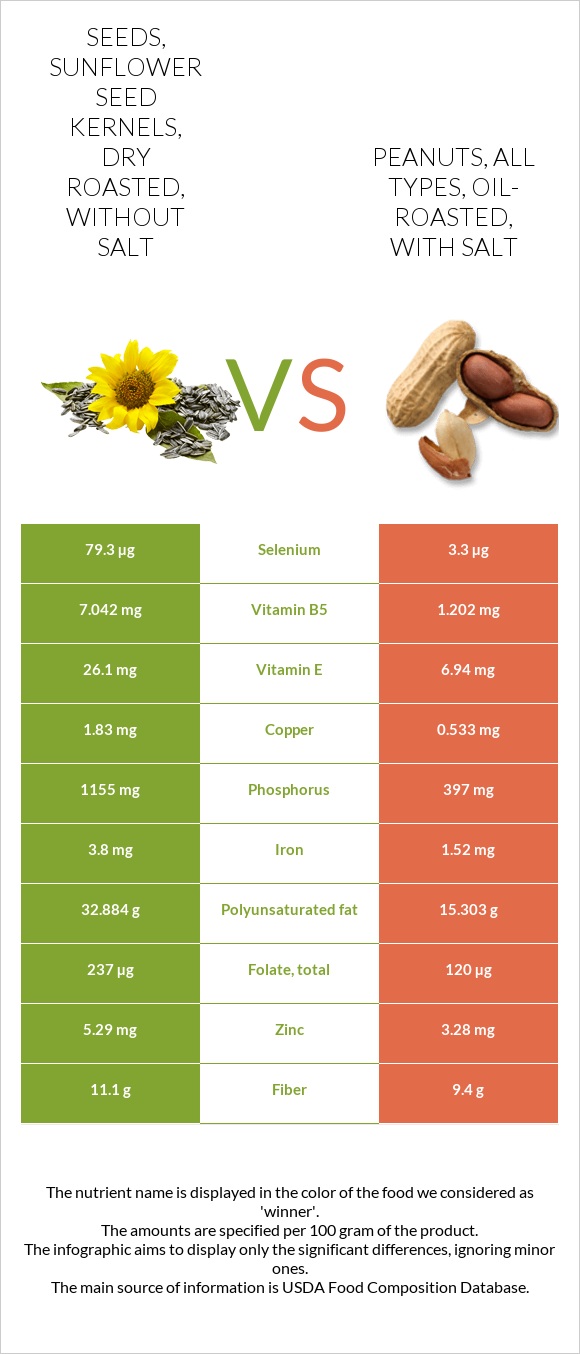Seeds, sunflower seed kernels, dry roasted, without salt vs. Peanuts, all types, oil-roasted, with salt — In-Depth Nutrition Comparison
Compare
What are the main differences between seeds, sunflower seed kernels, dry roasted, without salt and peanuts, all types, oil-roasted, with salt?
- Seeds, sunflower seed kernels, dry roasted, without salt is richer in copper, selenium, vitamin E, vitamin B5, phosphorus, folate, iron, vitamin B6, and zinc, while peanuts, all types, oil-roasted, with salt is higher in vitamin B3.
- Seeds, sunflower seed kernels, dry roasted, without salt's daily need coverage for copper is 144% higher.
- Peanuts, all types, oil-roasted, with salt has 24 times less selenium than seeds, sunflower seed kernels, dry roasted, without salt. Seeds, sunflower seed kernels, dry roasted, without salt has 79.3µg of selenium, while peanuts, all types, oil-roasted, with salt has 3.3µg.
We used Seeds, sunflower seed kernels, dry roasted, without salt and Peanuts, all types, oil-roasted, with salt types in this comparison.
Infographic

Infographic link
Mineral Comparison
Mineral comparison score is based on the number of minerals by which one or the other food is richer. The "coverage" charts below show how much of the daily needs can be covered by 300 grams of the food.
| Contains more CalciumCalcium | +14.8% |
| Contains more PotassiumPotassium | +17.1% |
| Contains more IronIron | +150% |
| Contains more CopperCopper | +243.3% |
| Contains more ZincZinc | +61.3% |
| Contains more PhosphorusPhosphorus | +190.9% |
| Contains less SodiumSodium | -99.1% |
| Contains more ManganeseManganese | +14.4% |
| Contains more SeleniumSelenium | +2303% |
| Contains more MagnesiumMagnesium | +36.4% |
Vitamin Comparison
Vitamin comparison score is based on the number of vitamins by which one or the other food is richer. The "coverage" charts below show how much of the daily needs can be covered by 300 grams of the food.
| Contains more Vitamin CVitamin C | +75% |
| Contains more Vitamin EVitamin E | +276.1% |
| Contains more Vitamin B1Vitamin B1 | +24.7% |
| Contains more Vitamin B2Vitamin B2 | +176.4% |
| Contains more Vitamin B5Vitamin B5 | +485.9% |
| Contains more Vitamin B6Vitamin B6 | +74.4% |
| Contains more Vitamin KVitamin K | +∞% |
| Contains more FolateFolate | +97.5% |
| Contains more Vitamin B3Vitamin B3 | +96.3% |
All nutrients comparison - raw data values
| Nutrient |  |
 |
DV% diff. |
| Copper | 1.83mg | 0.533mg | 144% |
| Selenium | 79.3µg | 3.3µg | 138% |
| Vitamin E | 26.1mg | 6.94mg | 128% |
| Vitamin B5 | 7.042mg | 1.202mg | 117% |
| Polyunsaturated fat | 32.884g | 15.303g | 117% |
| Phosphorus | 1155mg | 397mg | 108% |
| Vitamin B3 | 7.042mg | 13.825mg | 42% |
| Monounsaturated fat | 9.505g | 25.995g | 41% |
| Iron | 3.8mg | 1.52mg | 29% |
| Folate | 237µg | 120µg | 29% |
| Vitamin B6 | 0.804mg | 0.461mg | 26% |
| Zinc | 5.29mg | 3.28mg | 18% |
| Protein | 19.33g | 28.03g | 17% |
| Saturated fat | 5.219g | 8.655g | 16% |
| Sodium | 3mg | 320mg | 14% |
| Manganese | 2.11mg | 1.845mg | 12% |
| Vitamin B2 | 0.246mg | 0.089mg | 12% |
| Magnesium | 129mg | 176mg | 11% |
| Fiber | 11.1g | 9.4g | 7% |
| Fats | 49.8g | 52.5g | 4% |
| Potassium | 850mg | 726mg | 4% |
| Carbs | 24.07g | 15.26g | 3% |
| Vitamin B1 | 0.106mg | 0.085mg | 2% |
| Vitamin K | 2.7µg | 0µg | 2% |
| Calories | 582kcal | 599kcal | 1% |
| Vitamin C | 1.4mg | 0.8mg | 1% |
| Calcium | 70mg | 61mg | 1% |
| Starch | 3.07g | 1% | |
| Net carbs | 12.97g | 5.86g | N/A |
| Sugar | 2.73g | 4.18g | N/A |
| Choline | 55.1mg | 55.3mg | 0% |
| Tryptophan | 0.295mg | 0.231mg | 0% |
| Threonine | 0.788mg | 0.61mg | 0% |
| Isoleucine | 0.967mg | 0.978mg | 0% |
| Leucine | 1.408mg | 1.812mg | 0% |
| Lysine | 0.795mg | 0.945mg | 0% |
| Methionine | 0.42mg | 0.291mg | 0% |
| Phenylalanine | 0.992mg | 1.427mg | 0% |
| Valine | 1.116mg | 1.146mg | 0% |
| Histidine | 0.536mg | 0.655mg | 0% |
| Fructose | 0.08g | 0% | |
| Omega-6 - Gamma-linoleic acid | 0.038g | N/A | |
| Omega-6 - Eicosadienoic acid | 0.038g | N/A |
Macronutrient Comparison
Macronutrient breakdown side-by-side comparison
Protein:
19.33 g
Fats:
49.8 g
Carbs:
24.07 g
Water:
1.2 g
Other:
5.6 g
Protein:
28.03 g
Fats:
52.5 g
Carbs:
15.26 g
Water:
1.45 g
Other:
2.76 g
| Contains more CarbsCarbs | +57.7% |
| Contains more OtherOther | +102.9% |
| Contains more ProteinProtein | +45% |
| Contains more WaterWater | +20.8% |
~equal in
Fats
~52.5g
Fat Type Comparison
Fat type breakdown side-by-side comparison
Saturated fat:
Sat. Fat
5.219 g
Monounsaturated fat:
Mono. Fat
9.505 g
Polyunsaturated fat:
Poly. Fat
32.884 g
Saturated fat:
Sat. Fat
8.655 g
Monounsaturated fat:
Mono. Fat
25.995 g
Polyunsaturated fat:
Poly. Fat
15.303 g
| Contains less Sat. FatSaturated fat | -39.7% |
| Contains more Poly. FatPolyunsaturated fat | +114.9% |
| Contains more Mono. FatMonounsaturated fat | +173.5% |